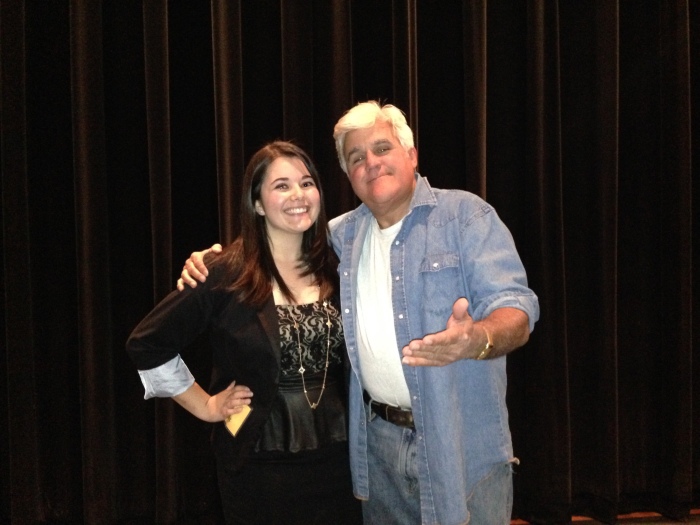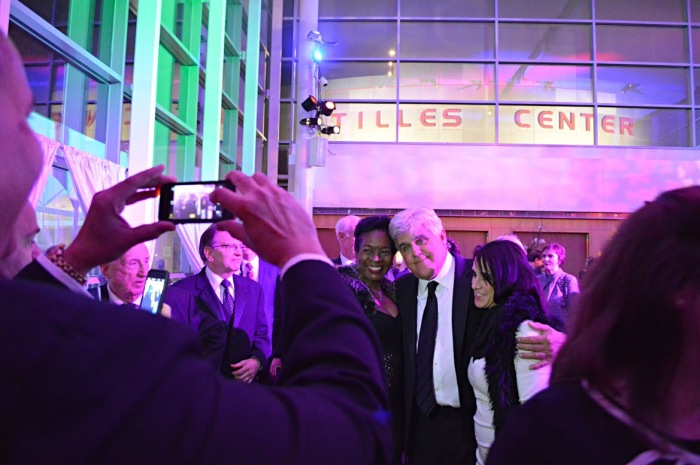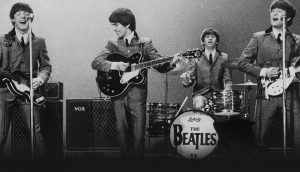By Alyssa Seidman
Co-Editor-in-Chief
Behind a dressing room door backstage at the Tilles Center for the Performing Arts, comedian and former Tonight Show host Mr. Jay Leno, decked in denim and a white t-shirt, prepared for his stand-up act. Leno was the headlining performer for the annual Gala on Saturday, Nov. 8. Despite the small space, Leno was cool and comfortable during his interview with The Pioneer, having had many years’ experience interviewing and performing for a live audience. Leno talked about life after The Tonight Show, his return to the stand-up stage, and the importance of comedy in a dismal world.

The Pioneer (TP): Earlier this year, you said goodbye to The Tonight Show after more than 20 years of entertaining audiences as its host. How has the transition been from late night TV back to your roots in stand-up comedy?
Jay Leno (JL): Well, it’s not really that bad; it’s not different. When you do The Tonight Show, no matter what goes on, you still have to write 14 minutes of jokes every single day, and that takes anywhere from six hours to whatever it takes to finish. So, when you don’t have to do that it just frees up more time. Now, I can travel on Thursdays and Tuesdays and Mondays, whereas before I could usually travel on the weekends. I was a stand-up comedian before I did The Tonight Show; that was the anomaly. And now I’m just back on the road again.
TP: With your history as a stand-up comedian, developing new content, seeing what works and doesn’t work, and delivering a monologue night after night, did you find it difficult coming up with fresh material on a daily basis during your years on The Tonight Show?
JL: Writing The Tonight Show monologue is different than writing an act. When you do The Tonight Show, you do different jokes in the same place every night, and when you go on the road you do the same jokes in a different place every night. But the advantage of doing The Tonight Show is hopefully you’re the first person out there with a joke about whatever the subject is. The bad news, you don’t get a chance to develop it and make “a bid” out of it; it’s just a one-liner or something. When you’re on the road, you can try it out differently [every night], so by the time the weekend comes, you’ve done it enough times so you can stretch it out and let it breathe for a little bit.
TP: With regard to that last question, how does the development process differ when creating a full stand-up routine?
JL: You try to create a couple of minutes a week, which doesn’t sound like very much, but at the end of the month, if you have 10 or 15 new minutes, that’s huge. Comics are inherently pretty lazy, and trying to find something everybody thinks is funny [is tough]. You tend to analyze the laughs, you do a joke and sometimes it gets the wrong kind of laugh. So you just have to sort of feel it out, and listen to it. I try to hit a broad audience as opposed to a specific audience, and one isn’t better than the other, it’s just how you work.
TP: Since you’re performing on a college campus tonight, I am compelled to ask about your years at Emerson College in Boston. I understand that you were responsible for starting a comedy club there as an undergrad? How did that experience impact your career?
JL: When I went to school, it was the ’70s, and it was [all] “yo, stop your war machine,” and all that kind of stuff. You had a lot of people with no money willing to be entertained by people with no talent essentially, and it was mostly folk singers and rock bands. Consequently, [I] would emcee some of those, and you try to do some funny stuff in between. There was no Internet, there was no TV in the dorms, [and] so you would go to a student show.
TP: In honor of your passion for classic cars and motorbikes, 20th Century Cycles and Joe’s Garage, two local body shops on Long Island, donated the motorcycles on display in the atrium for tonight’s Gala. Where does your love for automobiles come from?
JL: I like things that roll, and explode, and make noise. When you work with mechanical things, there’s a definite beginning and end; when you tell jokes, some people like it and some people don’t. But when you take something that’s broken and you fix it, nobody can say it’s not running. So, there’s this sense of satisfaction of fixing something, and plus when you work with your hands you tend to appreciate how easy it is to be successful in show business. Show business is kind of like champagne; if you drink it every day, you just become an alcoholic.
TP: I saw that you donated $100,000 to a scholarship fund at Salem State in honor of your mentor, Lennie Sogoloff? Can you describe Sogoloff’s influence on your life in relation to your success in the business, and also how philanthropy is important to you?
JL: Lennie was a nightclub owner; he had a nightclub called Lennie’s on the Turnpike, which is just the funniest-sounding name. But he was a very nice guy, and I went in one day and said, “I’m trying to be a comedian,” and I had to stand in front of his desk and tell some jokes. He kind of made me the house emcee and the house comic, and it was a great place to learn and perform and do things. So he was a great influence for me; he teamed me up with Miles Davis and Mose Allison and all the jazz greats of the ’50s and early ’60s, so that was pretty good. Philanthropy is important obviously; you can only eat so much pie, and I have as much pie as I need, so it doesn’t hurt to spread it around.
TP: Last night, you returned to late night as a guest on The Tonight Show with new host, and your successor, Jimmy Fallon. How did it feel to revisit your old stomping ground?
JL: Oh, it was fun! I like Jimmy; he’s a great guy. We had a good time.
TP: Do you think he’s doing a good job?
JL: Yeah, he’s doing a real good job. He brought something new to it [with the] viral videos. In my age, I can’t really pretend to know all of Jay-Z’s music, okay? Because [then] you’re the creepy old guy. You have to play your age.
TP: How has comedy changed your life?
JL: I was dyslexic; I was not a very good student. So I thought I would do [comedy] until I had to get a real job. I had a teacher when I was in high school, Mrs. Hawks, and she stopped me one day in the hall and said, “You’re always screwing around in class, disrupting, and making noise.” She said, “Why don’t you write some of these stories down, and you could read them to the class, and I could give you credit for creative writing.” It was the first time in my life I actually enjoyed doing homework, and I would spend a couple of hours trying to get it right. When I read it to the class, it wouldn’t get laughs, and I would learn “oh, okay that sentence went on too long.” I ha[d] no need for algebra, but this was something I thought was pretty cool. I never thought anything I learned in school would be beneficial to something I would do in real life, and then all of a sudden here was something that I liked doing and that people seemed to like.
After his interview with The Pioneer, Leno performed his 90-minute comedy act. He greeted the sold-out show at the Tilles Center in a suit and tie, microphone in hand. His jokes were met with uproarious laughter and occasional applause. His set resonated the classical humor he demonstrated on The Tonight Show, and proved his so-called title as “the hardest working man in show business,” although he denied this to The Pioneer.
Leno was awarded the 17th Annual Mark Twain Prize for American Humor by The Kennedy Center on Oct. 19, and will return to the small screen in 2015 with Jay Leno’s Garage, a new TV show based on his popular web series of the same name.




Be First to Comment